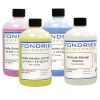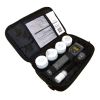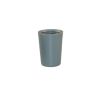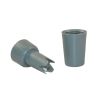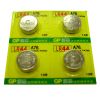YSI EcoSense pH10A pH Pen
Features
- IP-67 Waterproof housing
- Replaceable single- or double-junction electrodes
- Automatic calibration and buffer recognition
- Expedited repair and warranty service
- Lifetime technical support
- More
Overview
YSI's EcoSense pH10A pH & Temperature Pen is the perfect instrument for economical spot sampling of pH and temperature in applications such as wastewater, surface water, aquaculture, hydroponics, pools, and education. The pH10A pen features an easy-to-use graphic interface, simple one-hand operation, memory, and low cost of ownership over the life of the product.
Benefits
- Waterproof IP-67
- 1-year warranty
- Automatic calibration and buffer recognition
- 50-set memory (pH, temp, date and time stamp)
- Replaceable single- or double-junction electrode
- GLP functionality
- 1-, 2-, or 3-point calibration
- Hold feature locks stable readings on the display
- CE compliance
- >200 hour battery life with low battery indicator
- Operating Range: 0.0 to 50.0 C (32.0 to 122.0 F)
- Water Resistance: IP-67 waterproof case
- Weight with Batteries: 105 grams (3.7 ounces)
- ATC Probe: Thermistor
- Battery: Four LR44 alkalines included with purchase
- Battery Life: Approximately 35 hours
- pH Temp Compensation: Auto 0.0 to 99.9 C
- pH Buffer Recognition: USA (4.01, 7.00, & 10.01) or NIST (4.01, 6.86, & 9.18)
- pH Calibration Temp: 0.0 to 60 C (0.0 to 140.0 F)
- pH Offset Recognition: +90 mV at pH 7.00 or +98.3 mV / -81.7 mV at pH 6.86
- pH Slope Recognition: +30% at pH 4.00, 4.01, 9.18, or 10.01
- Memory: Non-volatile; stores 50 sets (pH, temperature, date and time stamp)
- (1) EcoSense pH10A pH & Temperature Pen
- (4) A76 batteries
- (1) Operations manual
In The News
Ocean acidification: University of Washington's giant plastic bags help control research conditions
With oceans becoming more acidic worldwide, scientists are getting creative in designing experiments to study them. For example, one group at the University of Washington is using giant plastic bags to study ocean acidification. Each bag holds about 3,000 liters of seawater and sits in a cylinder-like cage for stability. The group at UW, made up of professors and students, is controlling carbon dioxide levels in the bags over a nearly three-week period, during which they are looking at the effects of increased acidity on organisms living near the San Juan Islands. “These mesocosms are a way to do a traditional experiment you might do in a lab or classroom,” said Jim Murray, professor of oceanography at the University of Washington.
Read MoreNOAA Alaska buoy network to monitor North Pacific ocean acidification
National Oceanic and Atmospheric Administration scientists detected signs of ocean acidification in the waters that hold the vulnerable and valuable fisheries of the North Pacific off the coast of Alaska, but they only had a snapshot of the action. “We know that in this place were important commercial and subsistence fisheries that could be at risk from ocean acidification,” said Jeremy Mathis, a NOAA Pacific Marine Environmental Laboratory researcher and professor at the University of Alaska Fairbanks. To understand how ocean acidification affects the North Pacific, NOAA scientists created a mooring network that collects constant in situ data on parameters contributing to acidification. They hope it will reveal seasonal trends and patterns left out by their snapshots.
Read MoreWildfire Prevention in the Sierra Nevada Region with the Yuba Watershed Institute
Though recent wildfires have sparked new conversations about wildfire management and response, groups like the Yuba Watershed Institute have been monitoring the forests and water resources of the Sierra Nevada region for decades, managing approximately 5,000 acres of land with the Bureau of Land Management (BLM) and about 7,000 acres in private land partnerships. The goal of the Institute is to work with local communities and land agencies to improve watershed and forestry management through informed practices and public outreach. The goals of the Yuba Watershed Institute are three-fold: Improve the ability of fire suppression agencies like the California Department of Forestry and Fire Protection ( CAL FIRE ) and the US Forest Service.
Read More








